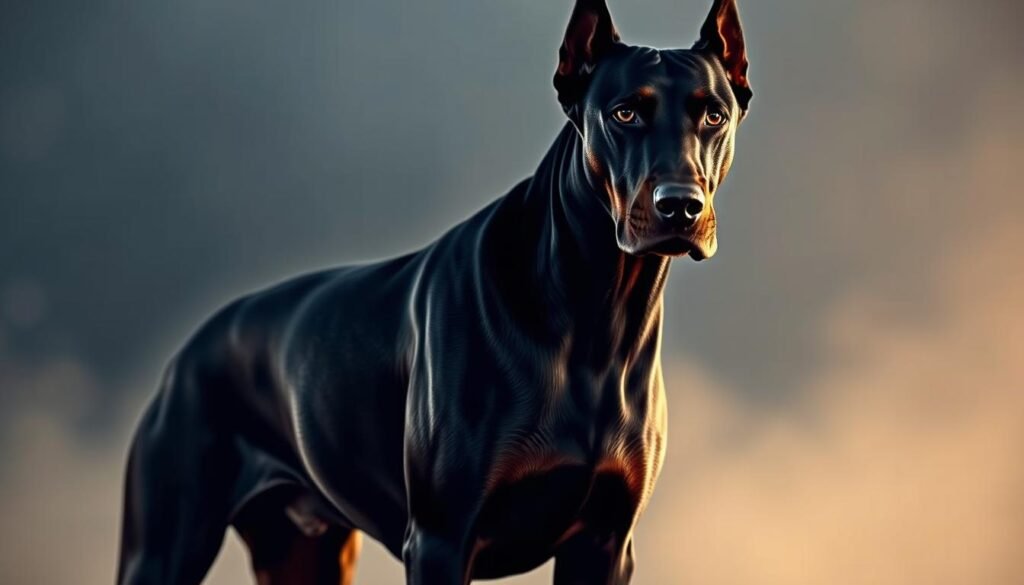I love dogs, and the Doberman Pinscher is one of my favorites. Known for being loyal and intelligent, this breed has a rich history. Originally from Germany, it was used as a guard and police dog. Now, it’s a cherished pet, thanks to its sleek and enigmatic black coat.
The black Doberman’s looks are just part of its charm. With the right training and care, it becomes a loving and faithful friend. In this article, we’ll explore the black Doberman’s history, traits, and needs. It’s a detailed guide for anyone interested in this intriguing breed.
Key Takeaways
- Understanding the origins and history of the Doberman Pinscher breed.
- Exploring the characteristics and traits of the black Doberman.
- Learning about the needs and requirements for caring for a black Doberman.
- Discovering the benefits of having a black Doberman as a companion animal.
- Gaining insights into the training and socialization needs of the breed.
History and Origins of the Doberman Breed
Friedrich Louis Dobermann, a German tax collector and dog breeder, is credited with developing the Doberman Pinscher breed in the late 19th century. He wanted a dog that was loyal, intelligent, protective, and versatile. The result was a breed that excelled in various roles, from guard dog to companion animal.
Development in Germany
The Doberman Pinscher was bred in Germany during a time when dog breeding was becoming increasingly popular. Dobermann’s breeding program involved crossing various dog breeds to create a superior dog. The breeds used in the development of the Doberman Pinscher included the German Pinscher, the Black and Tan Terrier, and the Rottweiler, among others.
This mix resulted in a dog that was both fierce and loyal. These characteristics are still associated with the breed today.
Early Uses and Roles
Initially, Doberman Pinschers were used for guarding and protection purposes. Their intelligence, athleticism, and loyalty made them ideal for roles such as police dogs and military dogs. According to the American Kennel Club, the breed’s versatility and trainability have made it a favorite among law enforcement agencies and families alike.
Evolution of Breed Standards
Over the years, the Doberman Pinscher breed has undergone significant changes. Breeders have worked to refine the breed, emphasizing traits such as intelligence, loyalty, and a calm demeanor. The modern Doberman Pinscher is a far cry from its early ancestors.
It now has a more refined appearance and a wider range of colors. This includes the striking black coat of the black Doberman.
Unique Characteristics of Black Dobermans
The black Doberman is a stunning example of canine elegance. They have a sleek coat and an athletic build. Their appearance is just the beginning of what makes them unique.
Color and Coat Type
The black Doberman’s sleek, black coat is striking. It’s not only visually appealing but also easy to maintain. Their short and smooth coat requires minimal grooming.
Their coat type adds to their overall appearance. It gives them a polished look that is both elegant and intimidating.
Size and Build
Black Dobermans are typically 24 to 28 inches tall. They weigh between 60 to 80 pounds. This size and build make them a compelling companion.
They are suitable for active families or individuals. Their muscular build and athletic physique stand out.
Distinctive Physical Features
Beyond their coat and size, black Dobermans have distinctive physical features. Their muscular structure and athletic ability make them stand out. They are both beautiful and capable.
The black Doberman’s unique blend of physical attributes makes them popular. Their striking appearance and loyal temperament make them a great addition to many families.
Personality Traits of Black Dobermans
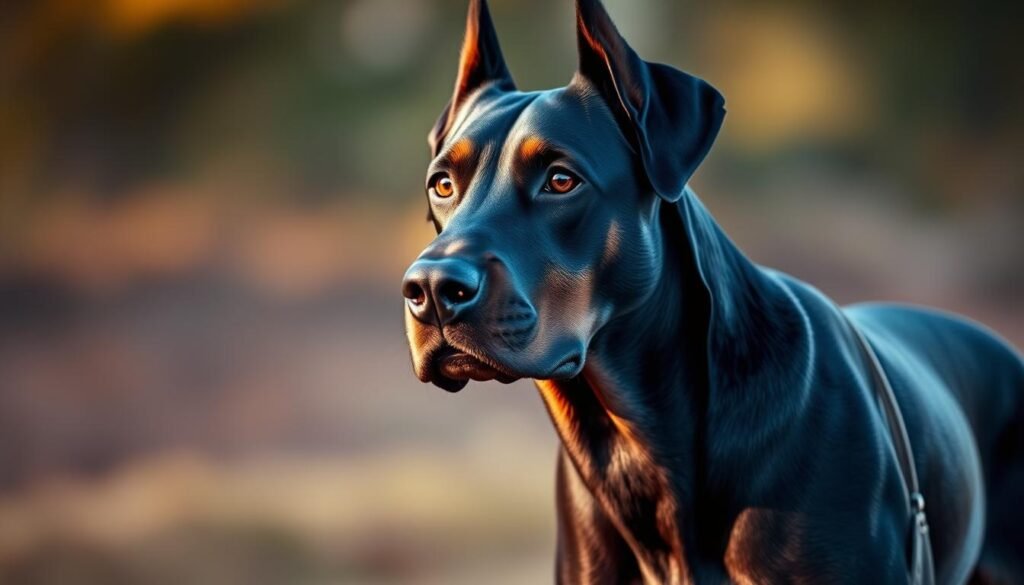
Black Dobermans are not just beautiful; they also have a rich inner world. They are loyal and intelligent. Their traits make them a favorite among dog owners. But, it’s important to understand their needs for a happy relationship.
Temperament Overview
The temperament of a Black Doberman is a mix of loyalty, intelligence, and athleticism. They are easy to train, making them great companions, guard dogs, and in dog sports. Their strong will and smarts mean they need consistent training and mental challenges to avoid boredom and bad behavior.
Key Temperament Traits:
- Loyal and protective of their family
- Highly intelligent and trainable
- Athletic and agile, requiring regular exercise
- Can be reserved with strangers, making socialization crucial
Social Behavior with Families
Black Dobermans are great with families, if socialized early. They bond strongly with their family and are often seen as gentle and loving. But, it’s important to watch how dogs and young children interact and teach kids how to safely play with dogs.
If you’re thinking of getting a Black Doberman, they love attention and interaction. For more on choosing the right Doberman, check out Doberman Planet.
Interaction with Strangers
Black Dobermans are loyal to their families but can be shy with strangers. Early socialization helps them feel confident and calm in new places. Introducing them to different people, places, and animals early on helps them interact well with strangers.
Tips for Socialization:
- Start socialization early, ideally from 8 weeks old
- Expose them to a variety of people, environments, and situations
- Use positive reinforcement training to encourage good behavior
Health Considerations for Black Dobermans
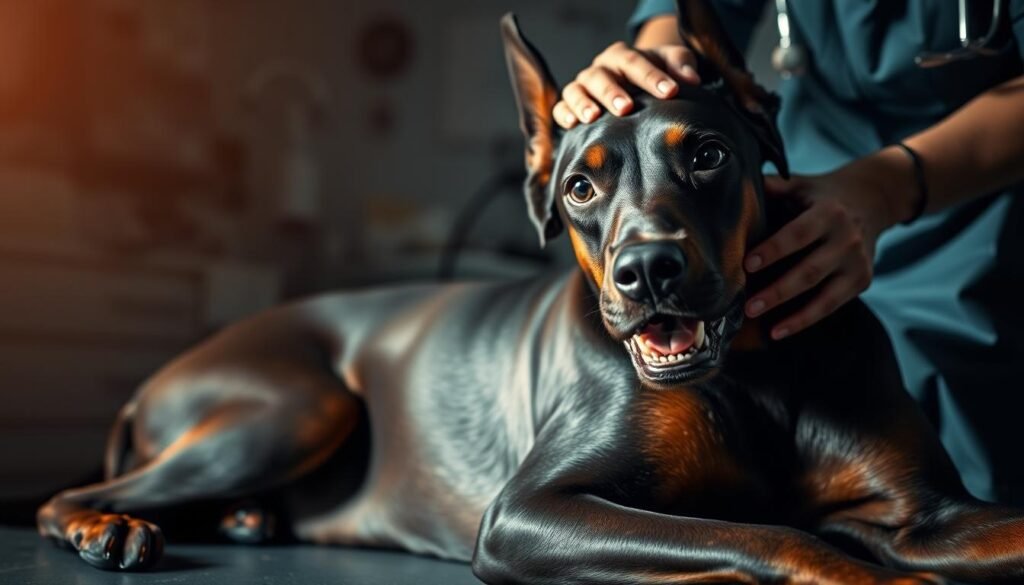
It’s important to know about the health of black Dobermans to keep them healthy. Like all breeds, they face certain health problems that can affect their life quality.
Common Health Issues
Black Dobermans can get sick with several health issues, including:
- Cardiomyopathy: A heart muscle condition that might lead to heart failure.
- Hip Dysplasia: A genetic issue that can cause arthritis and make moving hard.
- Certain Cancers: They might get specific cancers, so regular vet visits are key.
Preventative Care Tips
To lower these health risks, take these steps:
- Regular Vaccinations: Make sure your black Doberman gets all their shots to avoid diseases.
- Parasite Control: Check for and control fleas, ticks, and worms often.
- Balanced Diet: Feed them a diet that’s right for their needs to keep them healthy.
Importance of Regular Check-ups
Regular vet visits are crucial for your black Doberman’s health. These visits help catch health problems early. This way, your pet gets the right treatment on time.
By taking care of your black Doberman’s health, you can help them live a long, happy, and healthy life.
Training Tips for Black Dobermans
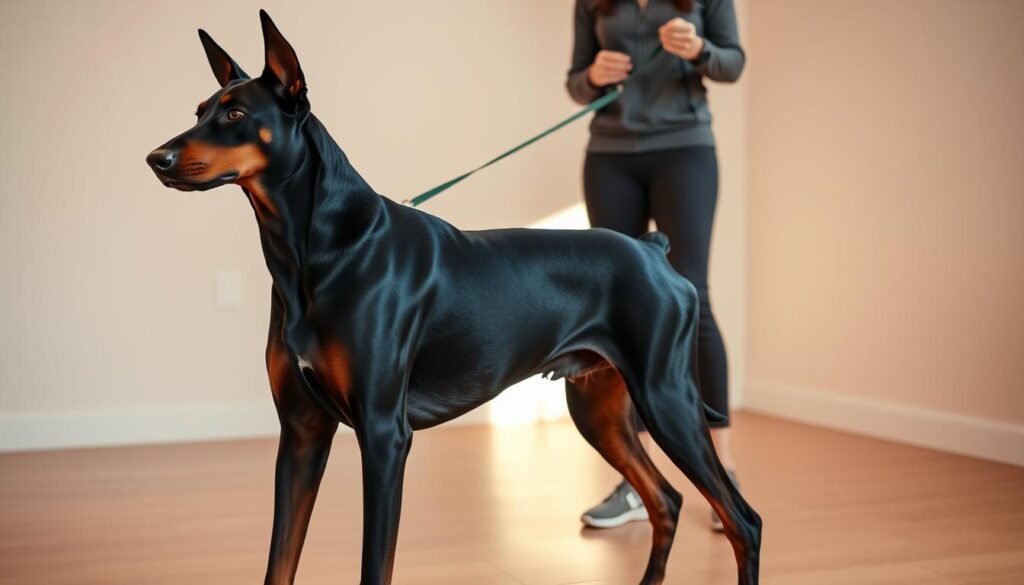
As a proud owner of a black Doberman, I’ve learned that effective training is crucial for a harmonious relationship. Training a black Doberman requires a comprehensive approach. This includes obedience training, socialization, and addressing behavior issues.
Obedience Training Essentials
Obedience training is the foundation of a well-behaved black Doberman. It involves teaching basic commands like “sit,” “stay,” and “come.” For more detailed guidance, you can refer to resources like Doberman Planet’s training guide. Consistency and positive reinforcement are key to successful obedience training.
- Start with short training sessions to keep your dog focused.
- Use positive reinforcement techniques such as treats and praise.
- Be consistent with commands and hand signals.
Socialization Practices
Socialization is critical for black Dobermans to become confident and calm in various environments. Introduce your dog to new people, places, and experiences gradually.
| Socialization Activity | Benefits |
|---|---|
| Meeting new people | Reduces anxiety and aggression towards strangers. |
| Visiting new places | Helps your dog become confident in new environments. |
| Interacting with other dogs | Teaches your dog appropriate canine behavior. |
Dealing with Behavior Issues
Addressing behavior issues promptly is essential to prevent them from becoming ingrained habits. Common issues include barking, chewing, and digging. Consistency and positive reinforcement are crucial in correcting these behaviors.
Tips for Addressing Behavior Issues:
- Identify the cause of the behavior issue.
- Use positive reinforcement to encourage good behavior.
- Be consistent in your response to the behavior.
By following these training tips, you can help your black Doberman become a well-behaved and loving companion.
Exercise Requirements for Black Dobermans
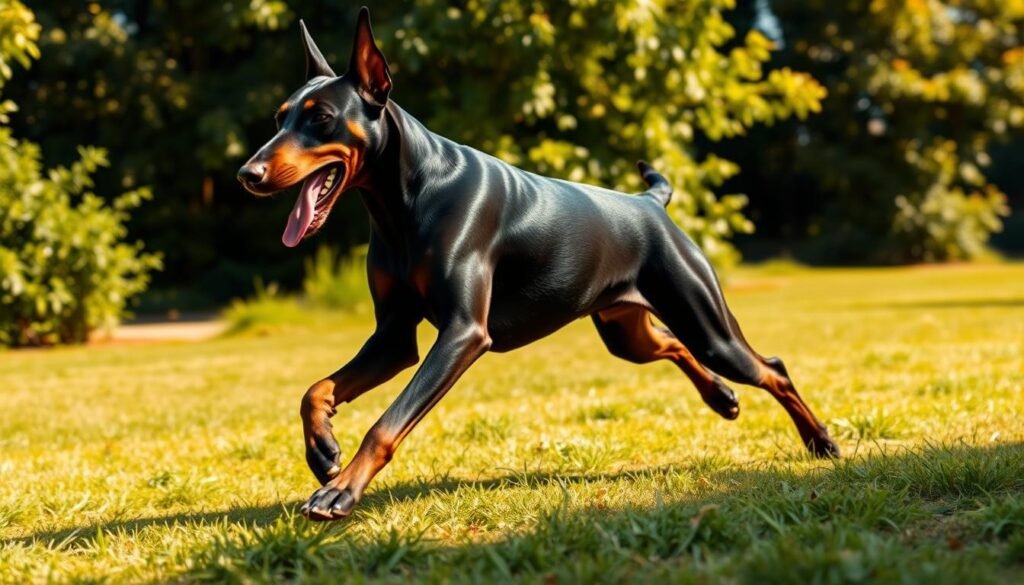
Black Dobermans are full of energy and need a good mix of physical and mental activities. It’s key to keep them healthy and happy.
Daily Activity Levels
Black Dobermans need lots of daily exercise to stay active and avoid boredom. Try to give them 60 to 90 minutes of activity each day. This can include walks, runs, and playtime.
This routine helps them burn off energy and stay in shape.
Recommended Types of Exercise
There are many ways to keep your black Doberman active and sharp. Some great options include:
- Agility training to challenge their physical abilities
- Obedience training to engage their minds
- Interactive games that encourage mental stimulation and physical activity
These activities not only keep them fit but also strengthen your bond with them.
Fun Activities to Keep Them Engaged
To make exercise fun for your black Doberman, try these ideas:
- Hide-and-seek games that challenge their sense of smell and tracking abilities
- Scent work that provides mental stimulation
- Playing fetch, a classic activity that dogs love and that provides excellent exercise
Mixing up their routine with fun activities keeps them excited and healthy.
Nutrition Needs for Black Dobermans
It’s important to give black Dobermans the right food for their health. A good diet gives them energy, keeps their coat shiny, and boosts their overall health.
Choosing the Right Dog Food
When picking food for your black Doberman, think about their age, size, and how active they are. Puppies, adults, and seniors need different things. For example, puppies need more protein and calories to grow.
Key Considerations:
- High-quality protein sources (e.g., chicken, beef)
- Balanced fat content for energy
- Complex carbohydrates for fiber
- Vitamins and minerals for overall health
Understanding Dietary Restrictions
Some black Dobermans might have food allergies or sensitivities. Signs include itching, stomach problems, or skin issues. If you think your dog has a food allergy, talk to your vet to figure out what to do.
Homemade Diets vs. Commercial Foods
Choosing between homemade diets and commercial dog foods depends on your dog’s needs and your ability to make a balanced homemade diet.
| Diet Type | Pros | Cons |
|---|---|---|
| Homemade Diets | Customizable, potentially fewer preservatives | Requires careful planning to ensure nutritional balance |
| Commercial Foods | Convenient, formulated to meet nutritional standards | May contain preservatives, potential for lower-quality ingredients |
It’s wise to talk to a vet or a canine nutritionist to find the best diet for your black Doberman.
By knowing your black Doberman’s nutritional needs and making smart diet choices, you can help them live a healthy and joyful life.
Grooming Requirements for Black Dobermans
To keep your Black Doberman healthy and happy, a consistent grooming routine is crucial. Regular grooming not only improves their appearance but also helps in detecting any potential health issues early.
Routine Grooming Practices
Routine grooming for Black Dobermans includes several essential practices. Nail trimming is vital to prevent overgrowth, which can cause discomfort and health problems. Ear cleaning is another important aspect, as it helps prevent infections. Regularly brushing their coat is also necessary, as it reduces shedding and distributes skin oils to keep their coat healthy.
I find that using the right tools, such as a nail clipper and an ear cleaning solution, makes these tasks easier and less stressful for both me and my dog.
Bathing Frequency and Techniques
Bathing your Black Doberman every 2-3 months is generally sufficient, depending on their lifestyle and activity level. When bathing, it’s essential to use a mild dog shampoo and conditioner to maintain the health and shine of their coat. Ensure thorough rinsing to prevent any soap residue from causing skin irritation.
Maintaining a Healthy Coat
A balanced diet rich in omega-3 fatty acids and vitamins is crucial for maintaining a healthy coat. Regular grooming practices, combined with a nutritious diet, will keep your Black Doberman’s coat shiny and healthy. I also recommend regular checks for any signs of skin issues or allergies.
By following these grooming tips, you can help ensure your Black Doberman remains healthy, happy, and looks their best.
Compatibility with Other Pets
Black Dobermans can get along with other pets if introduced right. They are loyal and protective, but not always aggressive. With the right steps, they can live well with dogs, cats, and other pets.
When introducing a Black Doberman to other dogs, pick a neutral spot. Start with visual introductions to let them get used to each other. Then, slowly increase their interaction while watching them closely and rewarding calm behavior.
Introducing to Other Dogs
Watch their body language when introducing your Black Doberman to other dogs. Growling or a tucked tail means they’re scared or upset. Be consistent and patient and use positive training to help them get along.
Make sure both dogs have their own space. This helps prevent fights and keeps everyone calm.
Living with Cats and Other Animals
Living with cats and other animals needs careful planning. Black Dobermans might chase small pets if not socialized early. Early exposure can help reduce this instinct. Give your cat or small pets a safe place to hide.
Always watch them closely, at least in the beginning. Reward your Black Doberman for being calm around other pets. This encourages good behavior.
Managing Multi-Pet Households
Managing a home with many pets and a Black Doberman means setting clear rules. Make sure all pets get enough attention and exercise. Having a routine helps keep peace among pets. Give each pet their own area in the house.
This way, you can make a happy home for all pets. Give your Black Doberman lots of exercise and mental games. Spend quality time with all pets to keep the household harmonious.
Choosing the Right Breeder or Adoption Center
Deciding to get a black Doberman is a big step. It’s important to pick a good breeder or adoption center. This choice affects your pet’s health, mood, and happiness.
Key Considerations for Breeders
When talking to breeders, ask about the parents’ health and mood. Also, find out their breeding approach and how they socialize puppies. A good breeder will share health info and ensure puppies are well-socialized.
Evaluating Adoption Centers
Adopting a dog means looking at their past, mood, and needs. Good adoption centers will share this info. They can help you find a black Doberman that suits your home.
Visits and Evaluations
It’s key to visit breeders or adoption centers. See how dogs are treated and the staff’s knowledge. This visit helps you make a smart choice.
With careful research, you can find a healthy, friendly black Doberman. Whether from a breeder or adoption center, your new pet will bring joy. They’ll be a happy, healthy part of your family.


